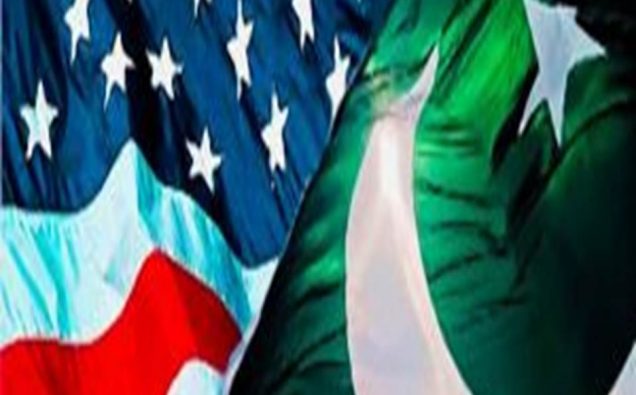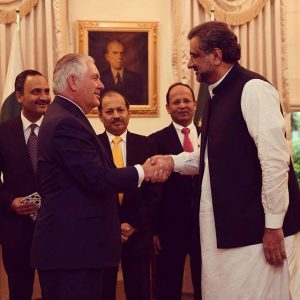
Secretary of State Rex Tillerson has denied that he lectured Pakistan on fighting terror during his visit to the region but said the United States has clearly laid out its counterterrorism expectations from Islamabad.
“Pakistan is a key partner for the stability of the region. We have a long history of positive partnership with Pakistan, but Pakistan must do more to eradicate militants and terrorists operating within its country,” he said in Geneva after a visit to the region.
“The people of Pakistan have much to gain from a stable, peaceful Afghanistan, and a region that denies safe haven to terrorists. This was my principal message to Prime Minister (Shahid Khaqan) Abbasi, Chief of Army Staff (Gen. Qamar Javed) Bajwa, and the Pakistani leadership,” he told journalists, according to a transcript released by the State Department.
Tillerson said he had “open, frank” conversations with Pakistani leaders and recalled the history of close cooperative ties between the two countries. He also noted that there are multiple influences on Afghanistan including India, Central Asia. He remarked that China has a role to play as well. During his visit, Tillerson said he explained to regional capitals what roles they could play under President Trump’s conditions-based strategy for South Asia, which expects contributions from the regional countries.
Asked if Pakistan’s response was that it would not be coerced into doing the U.S. bidding, Tilleer said “that would be a complete mischaracterization of the meeting.”
“It was a very open, frank conversation that began with a retracing of the history between the U.S. and Pakistan, which, by and large, has been a very, very positive history. We’ve had a deterioration in that relationship over the last 10 years, but prior to that we had very strong relations with Pakistan. Throughout the Cold War to the post-Cold War, the post-9/11, they were a tremendous partner in the post-9/11 years in terms of helping us apprehend a number of the individuals that were involved in the 9/11 attacks,” he said, acknowledging Pakistani countereterrorism efforts since 9/11 attacks.
The chief American diplomat felt “what was important to me is that let’s reconnect and remember that it hasn’t always been this way. So there was no lecturing and there was no lecturing of them back to me either. I view it as a respectful relationship. We have some very legitimate asks, some very legitimate concerns that we need their help addressing. I said to them, “You can do it or you can decide not to do it. And if you decide you don’t want to do it, just let us know. We’ll adjust our plans accordingly and we’ll deal with it ourselves.”
“And it’s not – that’s not a threat. It’s just a matter of fact. We have to deal with the conditions on the ground. And as you know, the entire South Asia strategy is a conditions-based strategy, and so the same message to Pakistan was: “Here’s what we need for Pakistan to do. We’re asking you to do this; we’re not demanding anything. You’re a sovereign country. You’ll decide what you want to do, but understand this is what we think is necessary. And if you don’t want to do that, don’t feel you can do it, we’ll adjust our tactics and our strategies to achieve the same objective a different way.”
When questioned specifically about the Pakistani response, Tillerson said:
“I think they share the same concern we have about the presence of terrorism. They are – they have been victims of terrorism. The Pakistanis have suffered significant losses fighting terrorism themselves. My conversation with them was about what we feel is important for Pakistan’s future stability. And yes, what they can do will have an important impact on creating conditions for reconciliation and peace talks in Afghanistan, but it’s not just about Afghanistan. It’s about our concern for Pakistan’s long-term stability as well.
Tillerson noted that President Donald Trump’s new Afghan policy envisages achieving peace, stability, and prosperity in Afghanistan through the involvement of regional partners – most importantly, Pakistan and India.
“Our goal is to work with our regional partners to root out terrorist safe havens in Afghanistan and Pakistan so that South Asia can enter a period of peace and prosperity.”
Tillerson also said Washington feels the “road to a stable, sovereign, unified, and democratic Afghanistan requires the Afghan Government to advance their commitment to reform.”
Questioned about the U.S. demand from Pakistan amid reports that in response to Washington presenting a list of 75 terrorists that need to be targeted, Islamabad handed over a list of 100 terrorists that it wants the U.S to go after, the top American diplomat responded:
“Well, I think what you just described is a very healthy exchange of information on terrorists, which is what we really hope to achieve with Pakistan. We have provided them specific asks, beyond just names of individuals. We’ve provided them specific asks. But we’ve also invited greater sharing from them as well. So we expect to receive information from them that will be useful.
“And the specific location on any given day of where certain individuals or certain cells may be located – they do move around. As you know, the Pakistan-Afghan border is quite porous; in fact, it’s ill-defined. And so we’re less concerned about are they in Pakistani territory, in Afghanistan territory, or – as we are obtaining information so that we can eliminate them.”
Asked about the sense that he lecturing Islamabad from Delhi and from Kabul, Tillerson replied:
“Well, I would not have characterized my direct discussions with them as lecturing at all. It was a very good and open exchange. In fact, we probably listened 80 percent of the time and we talked 20 percent. And it was important to me, because I have not engaged with Pakistani leadership previously. And so my objective was to listen a lot, to hear their perspective.
“We put our points forward. We put our expectations forward in no uncertain terms. There has been significant engagement prior to my visit, and there’ll be further engagement in the future, as we work through how we want to, as I said, exchange information and achieve the objective of eliminating these terrorist organizations, wherever they may be located. We had – it was very frank, very candid. We had the joint meeting with Prime Minister Abbasi and the full leadership team. And then I had a second meeting with Army General Bajwa and a couple of his close advisers, so we could have a more thorough discussion about some of the specifics.
“But I think it was a very open, candid, and frank exchange, and it’s – there’s nothing to be achieved by lecturing, but we should be very clear about expectations and what we’re asking. And either people will step up and meet those expectations or they won’t. We’re going to chart our course consistent with what Pakistan not just says they do but what they actually do.”
















